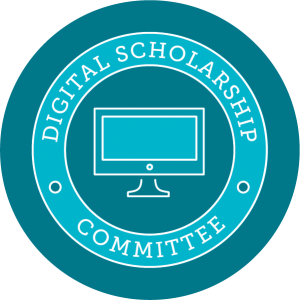As we head toward the fall semester, we in the Digital Scholarship Committee want to welcome our new readers and answer a question we often hear: What are digital humanities and digital scholarship?
Let’s start with digital humanities.
Digital humanities (DH) sits at the intersection of humanities and digital technology. It might sound boring, but if you’re in the humanities, or even just a scholar who has taken a history or literature course, you’ve probably already done something that qualifies as DH without realizing it.
DH is scholarship, teaching, and creative work done in the humanities, but with a digital spin. Humanities encompasses a variety of disciplines that study human culture, including language studies, history, literature, visual arts, music, media arts, information studies, gaming, and VR studies.
As for the digital component in the context of humanities, this could mean utilizing materials and resources that were “born-digital”, which is just a way of saying something that was originally created in digital form, or “digitized” from existing material objects, like print books or artworks. It could also mean exploring computational technologies such as algorithms, code, or data & text mining tools to understand how large collections of information work. Digital humanities scholars can also use virtual timelines, maps, and data organization tools to visualize, analyze, and interpret text and data in innovative ways.
In digital humanities, scholars engage with humanities topics through digital collaboration, creating digital projects, and using digital tools to fuel research. Instructors and professors can incorporate this work into their pedagogy to increase accessibility and encourage collaboration in the classroom. (This is known as digital pedagogy!). Digital humanities is so broad in definition that there’s even a website that offers a new definition from various publications with each page visit.
So, what is digital scholarship?
Digital scholarship (DS) also has a broad definition, but at its most fundamental level focuses on the digital aspects of scholarship and the influences technology has on academia, communication, collaboration, and our world.
What makes digital scholarship valuable is its inclusion of conversations related to the whole of academic scholarship including access, publishing, copyright, and preservation. It is also not uncommon for digital scholarship to include efforts to advocate for scholars, open access, interdisciplinary research and communication, and technological equity. Although it incorporates much of what digital humanities has to offer, digital scholarship may look different with each discipline.
Digital humanities, digital scholarship, and even digital pedagogy are growing with the educationallandscape, and so are their definitions. Through this blog and our Digital Scholarship Guide, we hope you’re able to locate tools and resources to help further your research, collaboration, and discovery.



Leave a Reply